Background: We report the findings from the first large, double-blind, placebo-controlled study conducted to evaluate the efficacy and safety of risperidone in the treatment of psychotic and behavioral symptoms in institutionalized elderly patients with dementia.
Method: 625 patients (67.8% women; mean age = 82.7 years) with DSM-IV diagnoses of Alzheimer’s disease (73%), vascular dementia (15%), or mixed dementia (12%) and significant psychotic and behavioral symptoms were included. Each patient was randomly assigned to receive placebo or 0.5 mg/day, 1 mg/day, or 2 mg/day of risperidone for 12 weeks. The primary outcome measure was the Behavioral Pathology in Alzheimer’s Disease rating scale (BEHAVE-AD).
Results: The study was completed by 70% of the patients. Baseline Functional Assessment Staging scores were 6 or 7 in more than 95% of the patients, indicating severe dementia. At endpoint, significantly greater reductions in BEHAVE-AD total scores and psychosis and aggressiveness subscale scores were seen in patients receiving 1 and 2 mg/day of risperidone than in placebo patients (p = .005 and p < .001, respectively). At week 12, 0.5 mg/day of risperidone was superior to placebo in reducing BEHAVE-AD aggression scores (p = .02). More adverse events were reported by patients receiving 2 mg/day of risperidone than 1 mg/day. The most common dose-related adverse events were extrapyramidal symptoms, somnolence, and mild peripheral edema. The frequency of extrapyramidal symptoms in patients receiving 1 mg/day of risperidone was not significantly greater than in placebo patients.
Conclusion: Risperidone significantly improved symptoms of psychosis and aggressive behavior in patients with severe dementia. Results show that 1 mg/day of risperidone is an appropriate dose for most elderly patients with dementia.
Enjoy this premium PDF as part of your membership benefits!





